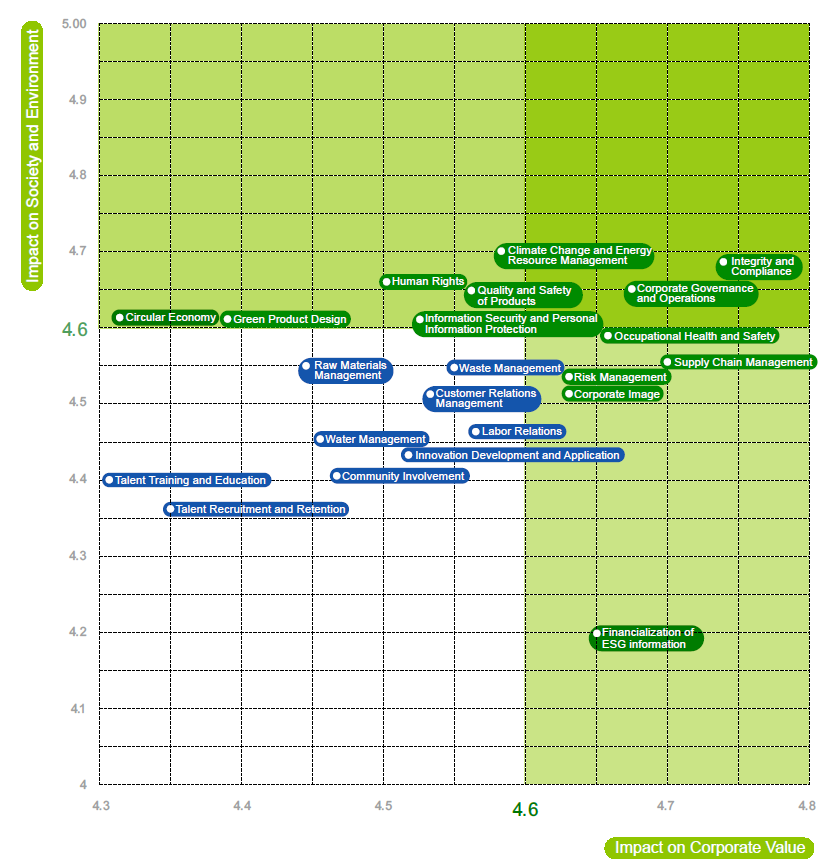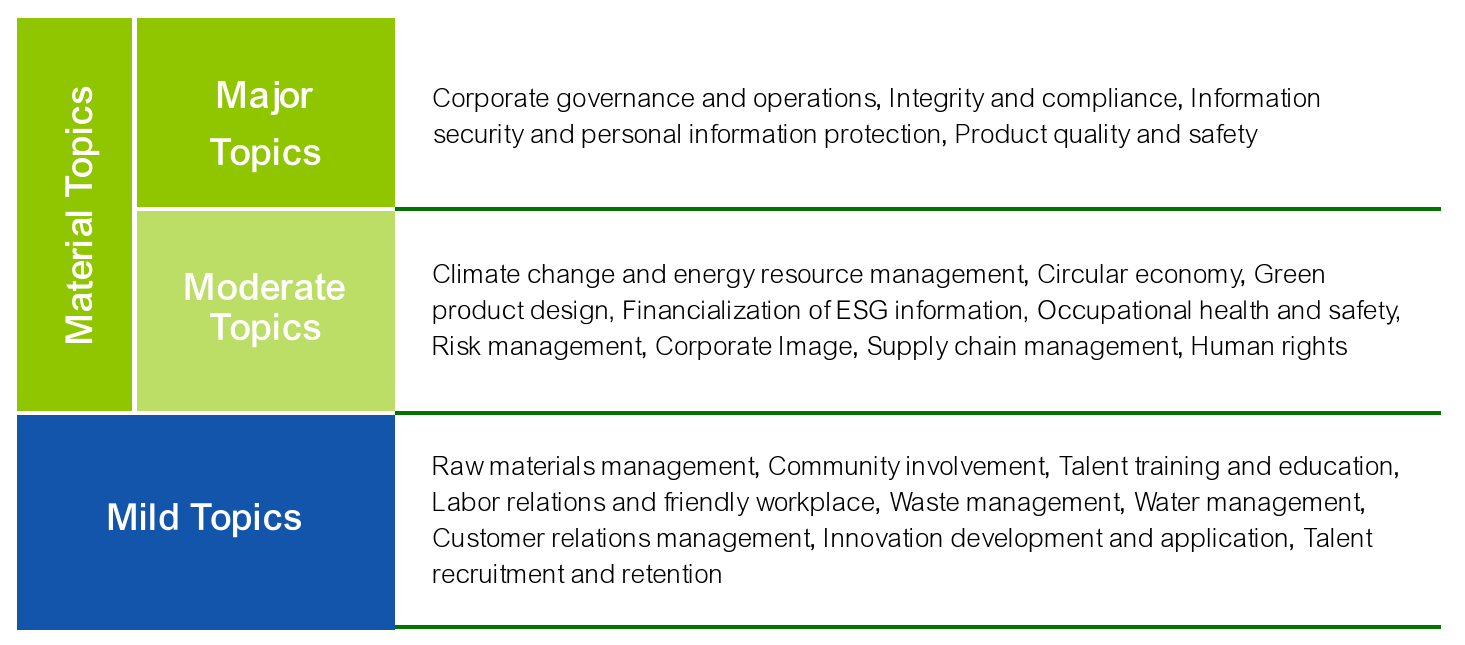|
MATERIAL TOPICS |
The LITEON Sustainability Report complies with the Global Reporting Initiative (GRI) Standards. Material topics are analyzed by following the process of identification, prioritization, validation, and review to validate the scope of the disclosure in the report as well as major internal/external sustainability challenges faced by the company. The process serves also as a comprehensive review of business performance. LITEON’s major topic identification work is conducted at least every three years, and the last implementation year of the stakeholder sustainability issue survey is 2023. Material topics of the year and stakeholders will be examined on an ongoing basis and modified as needed every year by the Corporate Sustainability Committee.

|
MATERIAL TOPIC MATRIX |


-
Green Product Design
At LITEON, we recognize that the increasing demand for low-carbon products is crucial for successful operations and market competitiveness. With the implementation of the Carbon Border Adjustment Mechanism (CBAM) law in May 2023, we are dedicated to driving sustainable manufacturing practices that prevent carbon leakage and support a global shift towards eco-friendly operations. Our commitment lies in providing the lowest carbon products in the market, and preparing our customers for the upcoming 2026 CBAM compliance.
We strive to build sustainable value chains and collaborate with suppliers to develop low-carbon sustainable materials, enhancing the industrial circular economy through innovative research and development. Our Life Cycle Thinking (LCT) approach allows us to effectively identify and analyze "hot spots" throughout our product life cycles, promoting sustainability.
Our key initiatives include launching a comprehensive carbon footprint inventory for all product categories and a Life Cycle Assessment (LCA) training program for our business units. We embrace the 3R principle—Reduce, Reuse, Recycle—as our standard for green design, minimizing environmental hazards, waste, and material usage while improving energy efficiency.
LITEON aims to achieve several ambitious targets by 2025:
- Complete LCAs for all product categories.
- Reduce carbon emissions by 5% for the next generation of products.
- Improve energy conversion efficiency of power supply products by 2% compared to 2016.
- Increase UV-LED energy efficiency by 60% (from 520mW to 830mW).
- Reduce plastic packaging by 300 tonnes from the 2018 baseline.
- Achieve a 98% waste conversion rate (UL2799 Gold) by 2024.
- Reach a 50% recycling ratio for steel by 2024, ultimately using over 95% recycled steel.
- Ensure 100% certification for three types of marine waste by 2025.
We are proud to report significant progress toward these goals, including the completion of product carbon footprint assessments for all categories and a reduction in packaging plastic by 270.7 tonnes in 2023. Additionally, we’ve improved energy conversion efficiency of power supply products by 8.17% since 2016 and increased UV-LED energy efficiency by 41.42% since 2018.
In line with our sustainability efforts, we have introduced the "555 Carbon Reduction Action," which aims for a 5% annual reduction in carbon intensity, a 5% reduction in next-generation product carbon footprints, and a commitment to net-zero emissions by 2050. Our enhanced internal carbon pricing plan—rooted in the principles of the CBAM—will drive accountability across our business units, linking performance metrics for 70% of our executives directly to our sustainability targets.
At LITEON, we are committed to being a sustainable partner, advancing green practices, and exceeding regulatory and customer expectations on our path towards an environmentally responsible future.
-
Information Security and Personal Information Protection
LITEON is dedicated to enhancing operational efficiency through digital transformation, while proactively addressing the increasing cybersecurity risks associated with this shift, particularly in light of the growing prevalsence of generative AI in 2023. To resolve these challenges, our Information Security Management System (ISMS) is designed to protect personal and confidential data, ensuring that all of LITEON's information assets remain secure. As we advance toward smart manufacturing, maintaining effective information security is essential for informed decision-making and mitigating risks.
Recognizing the vulnerabilities that AI tools can introduce, we continuously monitor for potential threats to data privacy and security, emphasizing the importance of robust protective measures against cyberattacks. The stakes are high; potential fines up to TWD 700 billion and reputational risks that could lead to order cancellations underscore the critical need for effective management of cybersecurity and data privacy.
To this end, we have implemented a comprehensive information security monitoring system, which includes hardware and software controls to conduct vulnerability assessments and prevent both external hacking attempts and internal data leaks. Our compliance with ISO/IEC 27001:2013, along with the PDCA operational model, ensures that our ISMS is continually improved and aligned with best practices in the field. We utilize the Azure Information Protection service to enhance data security, and all employees participate in annual information security training to foster a culture of awareness and vigilance.
Our strategic targets are ambitious: we aim to reach a Level 4 maturity in the NIST Cybersecurity Framework (NIST CSF), maintain our ISO 27001 certification through rigorous annual audits, and ensure that by the end of 2023, all production machinery is fortified against viruses and hacking. Additionally, we are implementing network segmentation and firewalls to provide proactive protection, while aligning our production environment with IEC 62443 and NIST CSF standards.
Currently, LITEON has achieved an average maturity level of Level 2 in the NIST CSF, with our ISO 27001 certification successfully updated in 2023. We are actively enhancing our global factories and offices with comprehensive information security analysis and early warning systems, with cybersecurity hardware installations expected to be completed by the latter half of 2023. Our New Taipei and Taoyuan facilities have been prioritized for enhanced protection using intrusion prevention systems.
To ensure accountability and alignment with our cybersecurity objectives, LITEON’s executive compensation structure incorporates key performance indicators related to information security. The compensation of our IT executive is closely tied to achieving Level 4 maturity in the NIST CSF, maintaining ISO 27001 certification, improving the security of production machinery, and advancing network security measures.
At LITEON, we recognize that robust information security and personal data protection are vital for building trust and sustaining growth in an increasingly digital world.
-
Climate Change Strategy and Energy Management
LITEON acknowledges the importance of addressing climate-related risks as a central aspect of our sustainability strategy. With net-zero emissions commitments from economies and key clients, we recognize the potential impact on our operations and the likelihood of increased production costs. To align with rising expectations for renewable energy, we have committed to sourcing 100% of our electricity from renewable sources, anticipating additional costs of approximately NT2.6 million per year due to regional Renewable Energy Certificates (RECs), and total expenditure ranging from NT3 million to NT7.5 million annually. Changing market dynamics and regulatory requirements may further compel us to increase renewable energy use or establish ambitious environmental goals, posing risks of cost transfer and reputational damage if compliance is not achieved. The ongoing lack of consensus on climate change regulations adds complexity and uncertainty to our operational landscape.
In response to these challenges, LITEON has conducted a thorough TCFD survey and launched its "555" carbon reduction action plan, which aims for a 5% annual reduction in carbon intensity and a commitment to achieving net-zero emissions by 2050. Our efforts focus on actively reducing scope 1 and 2 greenhouse gas emissions (GHG) while enhancing renewable energy usage and establishing a comprehensive carbon management platform. We also adjust our internal carbon pricing and integrate low-carbon sustainable practices within our supply chain. Key targets include:
- A 39.3% reduction in GHG emissions (Scope 1 and 2) intensity from a 2014 baseline.
- Achieving net-zero emissions by 2050 through the introduction of innovative materials, such as third-generation semiconductors, to improve product conversion efficiency and the use of recycled materials to minimize electronic waste.
- Committing to 100% renewable electricity by 2040 and adopting scientifically backed targets through the Science Based Targets initiative (SBTi).
As of now, LITEON has successfully reduced GHG emissions by 138,368 tons CO2e, achieving a 48% decrease in intensity. Our renewable energy usage has increased to 28.3% in 2023, supported by the implementation of 40 energy efficiency measures that saved approximately 15,530,000 kWh and reduced emissions by an additional 30,148 tons CO2e. We reaffirmed our commitment to 100% renewable energy in 2023 and joined the RE100 initiative in 2024. Our net-zero target is in the process of validation by SBTi.
To ensure accountability for our climate objectives, LITEON has integrated the "555 Carbon Reduction Action" into our executive compensation framework, linking key performance goals to incentive structures. Starting in 2023, the program focuses on achieving a 5% annual reduction in carbon intensity, a 5% decrease in the carbon footprint of next-generation products, and our net-zero commitment by 2050. This framework applies charges to our business units (BUs) and manufacturing Operational Combo Sites (OCS), directly influencing compensation and performance evalsuations for 70% of both corporate and executive teams based on progress against these metrics.
At LITEON, we are committed to proactive climate change strategies and energy management, striving to produce innovative solutions while minimizing our environmental impact and promoting a sustainable future.
LITEON aims to be the sustainable best partner for all stakeholders, creating maximum long-term value, both financially and non-financially. please refer to our Impact Analysis Report for more information.




